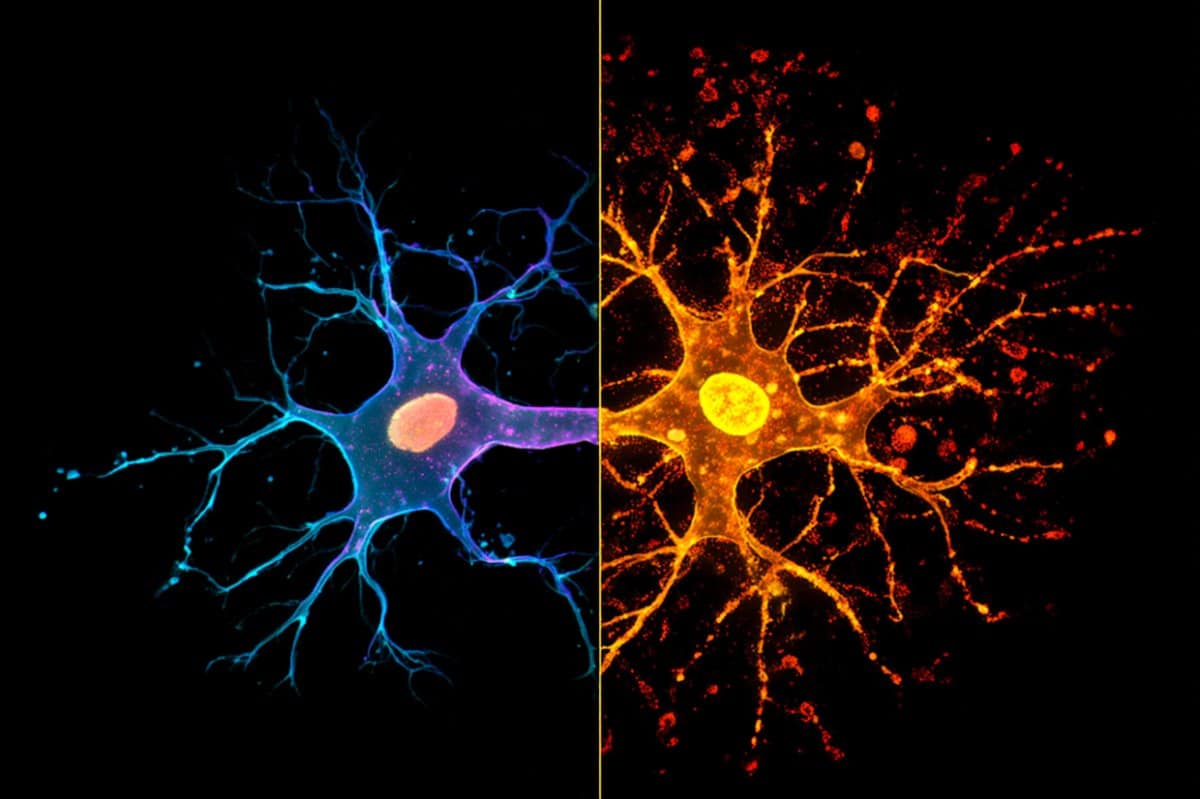Summary: A new study reveals that the brain’s vulnerability to disorders like multiple sclerosis and dementia may begin in early life. Researchers identified a developmental “switch” in astrocytes, the brain’s support cells, governed by the NR3C1 gene.
This switch epigenetically programs astrocytes to restrain inflammation in adulthood; without it, immune genes stay primed, making the brain overreact to inflammatory triggers. The findings highlight a critical early window that shapes lifelong brain health and suggest new therapeutic targets for neuroinflammatory and degenerative diseases.
Key Facts
Astrocyte Switch: The NR3C1 gene regulates early immune restraint in brain support cells.Epigenetic Memory: Loss of NR3C1 leaves immune genes “open,” driving excessive inflammation later.Disease Link: Findings connect early astrocyte programming to risks for MS, Alzheimer’s, and dementia.
Source: KAIST
Why do some people remain healthy through childhood yet become more vulnerable to brain disorders such as dementia later in life?
A KAIST (President Kwang Hyung Lee) -led team has uncovered a key part of the answer: a developmental ‘switch’ in astrocytes—the brain’s most abundant support cells that shapes how strongly the brain’s immune system reacts in adulthood.
 In effect, NR3C1 serves as an early ‘brake’ that prevents over-activation of astrocyte immune programs in adulthood. Credit: Neuroscience News
In effect, NR3C1 serves as an early ‘brake’ that prevents over-activation of astrocyte immune programs in adulthood. Credit: Neuroscience News
The study identifies a gene, NR3C1 (encoding the glucocorticoid receptor), as a master regulator of this switch and shows how early-life epigenetic ‘memory’ can predispose the adult brain to excessive inflammation.
The work was carried out by a joint team led by Professor Inkyung Jung (Department of Biological Sciences, KAIST) and Associate Director Won-Suk Chung (Center for Vascular Research, Institute for Basic Science; Professor, KAIST Biological Sciences).
Using mouse models, the researchers mapped gene-regulatory programs across multiple stages of astrocyte development and found that NR3C1 acts during a brief early-postnatal window to enforce long-term immune restraint.
To build this map, the team combined state-of-the-art 3D epigenome profiling with RNA sequencing and chromatin accessibility analyses, capturing how DNA folds and which regulatory elements contact target genes. They identified 55 stage-specific transcription factors that guide astrocyte maturation; among them, NR3C1 emerged as the critical ‘switch’ in early life.
Notably, deleting NR3C1 in astrocytes did not disrupt normal development. However, when the adult mice were challenged with an autoimmune model of multiple sclerosis, animals lacking astrocytic NR3C1 mounted exaggerated inflammatory responses and developed more severe disease.
Mechanistically, the study shows that early loss of NR3C1 epigenetically primes immune genes – keeping their regulatory elements open and ready – so that later in life these genes respond too strongly to inflammatory cues. In effect, NR3C1 serves as an early ‘brake’ that prevents over-activation of astrocyte immune programs in adulthood.
“This is the first demonstration that astrocyte immune functions are governed by epigenetic memory,” said Professor Won-Suk Chung. “Our findings offer new clues to the origins of degenerative brain disorders, including Alzheimer’s disease.”
“We reveal a temporal regulatory window in astrocyte development that can set the stage for disease vulnerability in adulthood,” added Professor Inkyung Jung.
“Understanding the 3D genome logic behind these programs could open paths to therapies for immune-related brain disorders such as multiple sclerosis.”
The results of this study were published online on September 22 in the international journal Nature Communications (IF 15.7), with Dr. Seongwan Park and PhD student Hyeonji Park of KAIST’s Department of Biological Sciences as co-first authors.
Funding: This research was supported by the Suh Kyungbae Science Foundation, the Ministry of Health and Welfare, the Ministry of Science and ICT, and IBS.
About this genetics, neurology, and neurodevelopment research news
Author: JEEHYUN LEE
Source: KAIST
Contact: JEEHYUN LEE – KAIST
Image: The image is credited to Neuroscience News
Original Research: Open access.
“NR3C1-mediated epigenetic regulation suppresses astrocytic immune responses in mice” by Inkyung Jung et al. Nature Communications
Abstract
NR3C1-mediated epigenetic regulation suppresses astrocytic immune responses in mice
Astrocytes are critical contributors to brain disorders, yet the mechanisms underlying their selective vulnerability to specific diseases remain poorly understood.
Here, we demonstrate that NR3C1 acts as a key regulator of early postnatal astrocyte development, shaping long-term immune responses in mice.
Through integrative analyses of gene expression, chromatin accessibility, and long-range chromatin interactions, we identify 55 stage-specific TFs, with NR3C1 uniquely associated with early postnatal maturation.
Although mice lacking astrocytic NR3C1 exhibit no detectable developmental abnormalities, these mice display heightened susceptibility to exacerbated immune responses following adult-onset experimental autoimmune encephalomyelitis (EAE).
Many of the dysregulated EAE response genes are linked to candidate cis-regulatory elements altered by early NR3C1 loss, driving exacerbated inflammatory responses.
Notably, only NR3C1 depletion during early, but not late, astrocyte development induces long-lasting epigenetic reprogramming that primes astrocytic immune responses.
